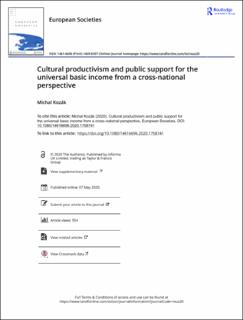| dc.contributor.author | Kozák, Michal | |
| dc.date.accessioned | 2021-04-29T12:58:10Z | |
| dc.date.available | 2021-04-29T12:58:10Z | |
| dc.date.created | 2020-11-18T15:00:16Z | |
| dc.date.issued | 2021 | |
| dc.Published | European Societies. 2020, 1-23. | |
| dc.identifier.issn | 1461-6696 | |
| dc.identifier.uri | https://hdl.handle.net/11250/2740413 | |
| dc.description.abstract | It has been hypothesized that the capacity of universal basic income (UBI) to attract wider public support is impaired by the strength of productivist cultural norms and values, common to the majority of develope societies. The paper contributes to literature on attitudes towards UBI by empirically investigating this hypothesis from a multi-level cross-national perspective, using the European Social Survey (ESS) Round 8 data on UBI support for 23 countries. It seeks to determine whether and to what extent the strength of cultural productivism can explain cross-national variation in public support for the implementation of UBI. Two main findings are reported. First, the results demonstrate that the public are less susceptible to supporting UBI in countries where average employment commitment is higher. Second, the results show that, even though employment commitment is a strong predictor of cross-national variation in the public support for UBI, the effect is surpassed and explained by GDP, which itself is negatively related to the outcome. The study argues that the capacity of UBI to appeal to the general public is limited by the prosperity of post-industrial societies, rather than by the cultural attachment of their populations to paid work. | en_US |
| dc.language.iso | eng | en_US |
| dc.publisher | Routledge | en_US |
| dc.rights | Attribution-NonCommercial-NoDerivatives 4.0 Internasjonal | * |
| dc.rights.uri | http://creativecommons.org/licenses/by-nc-nd/4.0/deed.no | * |
| dc.title | Cultural productivism and public support for the universal basic income from a cross-national perspective | en_US |
| dc.type | Journal article | en_US |
| dc.type | Peer reviewed | en_US |
| dc.description.version | publishedVersion | en_US |
| dc.rights.holder | Copyright 2020 The Author(s). | en_US |
| cristin.ispublished | true | |
| cristin.fulltext | original | |
| cristin.qualitycode | 2 | |
| dc.identifier.doi | https://doi.org/10.1080/14616696.2020.1758741 | |
| dc.identifier.cristin | 1849346 | |
| dc.source.journal | European Societies | en_US |
| dc.source.pagenumber | 23-45 | en_US |
| dc.identifier.citation | European Societies. 2021, 23 (1), 23-45. | en_US |
| dc.source.volume | 23 | en_US |
| dc.source.issue | 1 | en_US |

